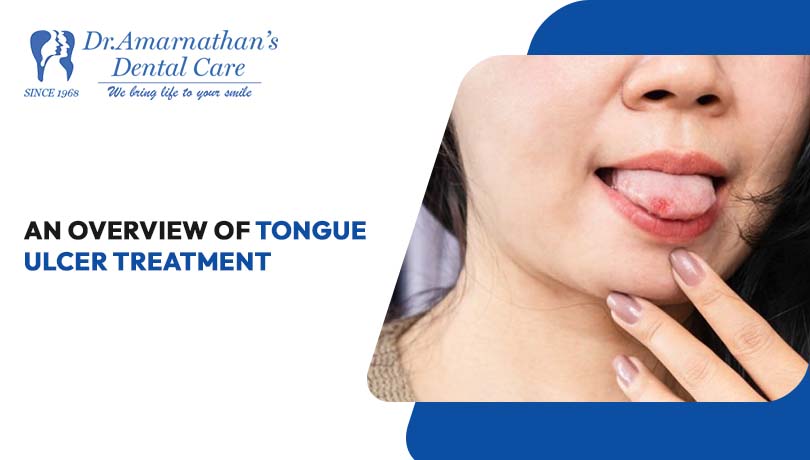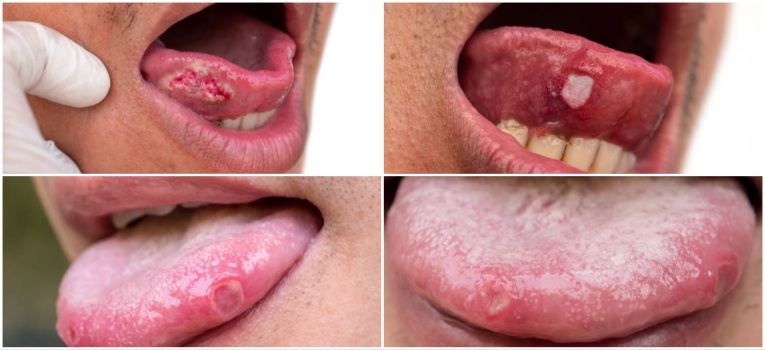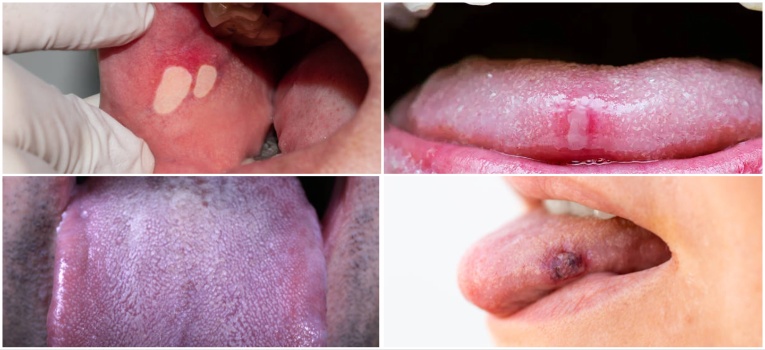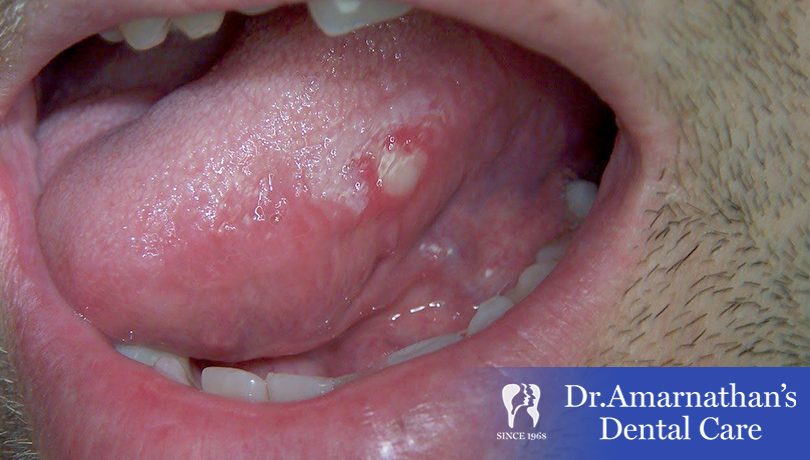
An Overview of Tongue Ulcer Treatment – 2024
Tongue ulcers, also known as canker sores, can be a painful and uncomfortable experience. In this blog post, we will delve into the various treatment options available for managing and alleviating the discomfort caused by tongue ulcers. We’ll discuss an overview of tongue ulcers, including their symptoms, causes, and prevention. We’ll also discuss various treatment options, from home remedies to medical interventions, so you can find relief and feel your best. By the end of this post, you’ll clearly understand how to address tongue ulcers and promote oral health effectively.
Tongue Ulcer
A tongue ulcer, also known as a canker sore or an aphthous ulcer, is a painful, open sore that can appear on the tongue within the mouth or on the gums. It is usually shallow and enclosed by a red border, making eating, drinking, or talking challenging.
Tongue ulcers are often benign and resolve independently within a week or two, although they can cause discomfort and irritation while present. The specific cause is not always evident, although stress, injury, hormone changes, or particular foods may all play a role in their development.
Symptoms of tongue ulcer
Tongue ulcers present the following symptoms:
- Pain or discomfort.
- A red or white sore on the tongue.
- Swelling or inflammation surrounding the sore.
- Difficulty eating or speaking, especially if the sore is significant and in a sensitive place.
- A tingling or burning feeling before the furious emerges.
These symptoms usually continue around 1-2 weeks until the ulcer heals.
Tongue Ulcer cause
Tongue ulcers can occur as a result of injury to the mouth caused by things including
- Injuries are caused by accidentally biting the tongue or brushing too hard.
- Foods with a spicy, acidic, or abrasive texture cause irritation.
- Hormonal imbalances, lack of sleep, or stress.
- Allergic responses to certain meals or oral care items.
- Viral infections include the herpes simplex virus.
- Certain medical disorders, including autoimmune illnesses and nutrition deficits.
- Minor tissue harm is caused by dental procedures, such as having a cavity filled.
- Wearing braces or retainers.
It may also be a genetic link to getting tongue ulcers. People may also suffer tongue ulcers when they initially quit smoking.
Medical conditions cause tongue ulcers
Tongue ulcers can be caused by several medical problems, including:
- Autoimmune illnesses (such as Behcet’s disease or Lupus).
- Inflammatory bowel illnesses (such as Crohn’s disease or ulcerative colitis).
- Celiac Disease.
- HIV/AIDS.
- Erythema multiforme.
- Reiter’s syndrome.
- Vitamin B12 insufficiency.
As part of their overall influence on the body, these disorders can lead to the development of tongue ulcers.
Treatments for tongue ulcers
Medical therapies for tongue ulcers
- Topical corticosteroids: Prescription ointments or gels relieve inflammation and facilitate healing.
- Topical Anesthetics: Numbing medications are available over the counter or on prescription to relieve pain.
- Oral corticosteroids: In extreme situations, oral medicines may be administered to treat extensive or chronic ulcers.
- Antimicrobial mouthwash: Prescription mouth rinses with chlorhexidine to prevent infection.
- Systemic medications: In situations involving underlying disorders such as autoimmune diseases, particular drugs are used to treat the primary ailment.
- Cauterization or Laser Therapy: Medical methods that help facilitate recovery in severe or recurring situations.
Contacting a healthcare expert for an accurate diagnosis and treatment plan based on the tongue ulcer’s unique features and underlying cause is essential.
Home remedies for tongue ulcer
Home remedies for tongue ulcers, often known as canker sores, include:
- Saltwater Rinse: Gargling with warm salt water might help to soothe and cure an ulcer.
- Honey: Applying a tiny amount of honey straight to the ulcer will help decrease inflammation and give comfort.
- Coconut Oil: Oil pulling or swishing coconut oil in one’s mouth for a few minutes may help relieve pain and improve healing.
- Aloe Vera Gel: Applying a tiny quantity of aloe vera gel directly to the ulcer will help relieve inflammation and speed healing.
If tongue ulcers continue or worsen despite home cures, or if other troubling symptoms accompany them, you should see a doctor.
Additionally, Avoid hot, acidic, or rough-textured meals, which may worsen the ulcer. Over-the-counter medications, such as oral numbing gels or patches, can relieve short pain.
Prevent tongue ulcers
To avoid tongue ulcers, consider these tips:
- Maintain proper dental hygiene: Brush your teeth and tongue regularly and floss to avoid irritation and infection.
- Avoid trigger foods: Avoid spicy, acidic, or rough-textured meals, which may lead to ulcer formation.
- Manage stress: Practice stress-reduction practices such as meditation or yoga, as stress might play a role.
- Use a gentle toothbrush: Choose a soft-bristled toothbrush to avoid irritation when cleaning your teeth.
- Stay hydrated: Drinking enough water promotes good dental health and may lower the incidence of ulcers.
- Check for food allergies: Identify and avoid foods that may cause allergic responses or sensitivities.
- Consider using dietary supplements: Maintain a healthy amount of vitamins and minerals, particularly B12, iron, and folic acid.
If you have recurring or severe tongue ulcers, see a doctor for a thorough assessment and individualized recommendations.
When to contact a doctor?
Consult a doctor if you have chronic or worsening tongue ulcers, especially if you have worrying symptoms such as fever, trouble swallowing, or considerable weight loss.
Seek medical assistance if you have repeated ulcers or if the ulcers are related to other health issues. A healthcare specialist can diagnose accurately, rule out significant problems, and propose suitable treatment choices based on your specific needs.
Takeaway
To summarize, treating tongue ulcers requires a combination of at-home therapies and, in some cases, medical assistance. Tongue ulcers can be treated in various ways, including saltwater rinses and topical treatments. Remember to practice proper dental hygiene, avoid irritants, and seek medical attention if ulcers persist or are associated with worrying symptoms. Individuals can take proactive actions to relieve discomfort and improve the healing of tongue ulcers by learning about the many treatment options available.
Tongue ulcer images








I already gave up on ever getting cured of HSV2 because i have try many treatment none of them work out for me i have gone to different hospital they always tell me the same thing there is no cure for herpes, when i came across a post about Dr Osaka in the net from a lady called Angela i contacted her and she reassured me with his herbal medicine which i took according to the way he instructed, that how i was cured. I doubted at first because i have been to a whole lot of reputable doctors, tried a lot of medicines but none was able to cure me. so i decided to listen to him and he commenced treatment, and under two weeks i was totally free from Herpes. i want to say a very big thank you to DR Osaka for what he has done in my life. feel free to leave him a message on email drosakaherbalhome99@gmail.com or also Whats-app him +2349024827182.. he also cure all this 1.HIV 2.HIV HPV 3 .ALS 4. BED WETTING DIABETES.
Am using this opportunity to thank Dr. Guba is a grateful thing to me, for over years I have been sick with Hepatitis B disease, I have done a lot of things to get cured of my diseases and nothing has worked out. I have taken different types of medication for it , but it still doesn’t work for me. I still keep going for a check up so that the doctor will tell me my disease has be gone, because i’m taking my medicine with no result nothing has been cured, I have spent a lot of money just to get cure of Hepatitis B. until my old time friend came to my place and saw what am going through, and then direct me to contact Dr. Guba who is a very powerful man, which I did explain my problem to Dr. Guba and send me a herbal remedy bottle and explain to me how I should drink it. So I started to drink the herbal tea in one week that I drink the herbal tea. I went for a check up to check if I’m cured from Hepatitis B disease, then the nurse told me nothing is wrong with me anymore and said I’m fine. I am the happiest person right now. I promise Dr. Guba I will testify about his good work on the internet. Reach out to Him Via: drgubahealingherbs@gmail.com Thank you so much sir for what you did for me you’re the best of all. WhatsApp +2348162388034 ORwebsite: https://drgubahealing herbs.wixsite.com/guba-healing-herbs